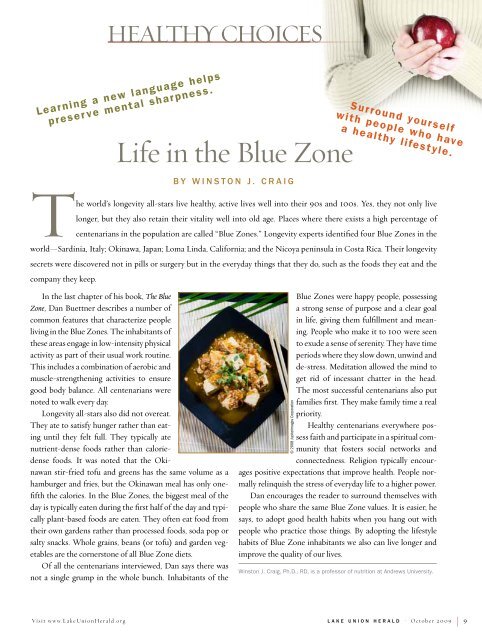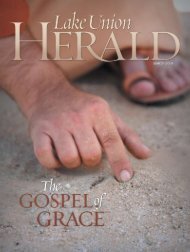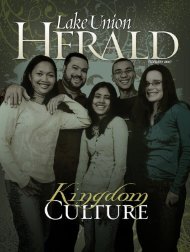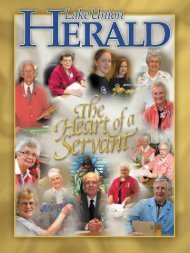YOUTHin Action - Lake Union Conference - General Conference of ...
YOUTHin Action - Lake Union Conference - General Conference of ...
YOUTHin Action - Lake Union Conference - General Conference of ...
You also want an ePaper? Increase the reach of your titles
YUMPU automatically turns print PDFs into web optimized ePapers that Google loves.
HEALTH| CHOICES<br />
Lear ning a new language helps<br />
preser ve mental shar pness.<br />
Life in the Blue Zone<br />
b y W i n s t o n J . C r a i g<br />
Sur round your self<br />
with people who have<br />
a healthy lifestyle.<br />
The world’s longevity all-stars live healthy, active lives well into their 90s and 100s. Yes, they not only live<br />
longer, but they also retain their vitality well into old age. Places where there exists a high percentage <strong>of</strong><br />
centenarians in the population are called “Blue Zones.” Longevity experts identified four Blue Zones in the<br />
world—Sardinia, Italy; Okinawa, Japan; Loma Linda, California; and the Nicoya peninsula in Costa Rica. Their longevity<br />
secrets were discovered not in pills or surgery but in the everyday things that they do, such as the foods they eat and the<br />
company they keep.<br />
In the last chapter <strong>of</strong> his book, The Blue<br />
Zone, Dan Buettner describes a number <strong>of</strong><br />
common features that characterize people<br />
living in the Blue Zones. The inhabitants <strong>of</strong><br />
these areas engage in low-intensity physical<br />
activity as part <strong>of</strong> their usual work routine.<br />
This includes a combination <strong>of</strong> aerobic and<br />
muscle-strengthening activities to ensure<br />
good body balance. All centenarians were<br />
noted to walk every day.<br />
Longevity all-stars also did not overeat.<br />
They ate to satisfy hunger rather than eating<br />
until they felt full. They typically ate<br />
nutrient-dense foods rather than caloriedense<br />
foods. It was noted that the Okinawan<br />
stir-fried t<strong>of</strong>u and greens has the same volume as a<br />
hamburger and fries, but the Okinawan meal has only onefifth<br />
the calories. In the Blue Zones, the biggest meal <strong>of</strong> the<br />
day is typically eaten during the first half <strong>of</strong> the day and typically<br />
plant-based foods are eaten. They <strong>of</strong>ten eat food from<br />
their own gardens rather than processed foods, soda pop or<br />
salty snacks. Whole grains, beans (or t<strong>of</strong>u) and garden vegetables<br />
are the cornerstone <strong>of</strong> all Blue Zone diets.<br />
Of all the centenarians interviewed, Dan says there was<br />
not a single grump in the whole bunch. Inhabitants <strong>of</strong> the<br />
Blue Zones were happy people, possessing<br />
a strong sense <strong>of</strong> purpose and a clear goal<br />
in life, giving them fulfillment and meaning.<br />
People who make it to 100 were seen<br />
to exude a sense <strong>of</strong> serenity. They have time<br />
periods where they slow down, unwind and<br />
de-stress. Meditation allowed the mind to<br />
get rid <strong>of</strong> incessant chatter in the head.<br />
The most successful centenarians also put<br />
families first. They make family time a real<br />
priority.<br />
Healthy centenarians everywhere possess<br />
faith and participate in a spiritual community<br />
that fosters social networks and<br />
connectedness. Religion typically encourages<br />
positive expectations that improve health. People normally<br />
relinquish the stress <strong>of</strong> everyday life to a higher power.<br />
Dan encourages the reader to surround themselves with<br />
people who share the same Blue Zone values. It is easier, he<br />
says, to adopt good health habits when you hang out with<br />
people who practice those things. By adopting the lifestyle<br />
habits <strong>of</strong> Blue Zone inhabitants we also can live longer and<br />
improve the quality <strong>of</strong> our lives.<br />
© 2008 Jupiterimages Corporation<br />
Winston J. Craig, Ph.D., RD, is a pr<strong>of</strong>essor <strong>of</strong> nutrition at Andrews University.<br />
Vi s i t w w w. L a k e Un i o n He r a l d . o r g L a k e U n i o n H e r a l d • Oc t o b e r 2 0 0 9 | 9
















